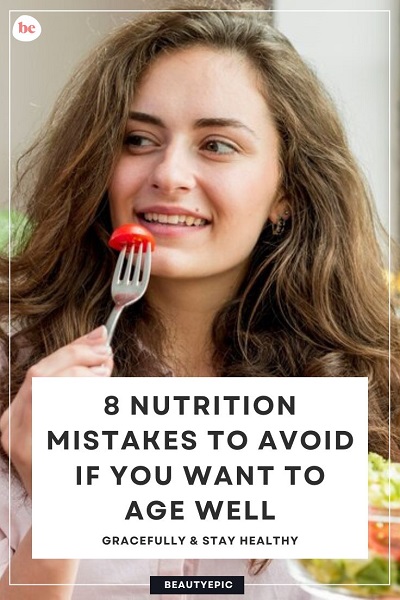
Important: This article is for informational purposes only. Please read our full disclaimer for more details.
Aging is a natural process, but how you age is largely influenced by the choices you make, especially when it comes to food. The right nutrition can help maintain energy levels, protect your heart, sharpen memory, and keep your skin glowing. On the flip side, poor eating habits can speed up cellular aging, lead to chronic disease, and reduce your quality of life.
According to a 2022 review published in Nutrients, diet is one of the most powerful modifiable factors in healthy aging (1). Nutrient-dense diets are linked to lower rates of cognitive decline, cardiovascular disease, and even wrinkles. Want to age like fine wine? Avoid these eight common nutrition pitfalls.
1. Skipping Protein as You Age
As you grow older, your body naturally loses muscle mass—a condition known as sarcopenia. Unfortunately, many older adults eat less protein, not more, at the time their bodies need it most.
- Why it matters: Muscle loss leads to weakness, frailty, and slower metabolism.
- Solution: Include lean protein at every meal—chicken, tofu, eggs, Greek yogurt, or legumes.
Research Insight: A 2018 study in The American Journal of Clinical Nutrition found that older adults who consumed higher protein preserved more lean muscle mass and strength over time (2).
2. Relying Too Much on Supplements Instead of Whole Foods
Supplements are popular, but they’re no replacement for the real thing. Whole foods provide a synergistic mix of vitamins, minerals, fiber, and antioxidants that isolated pills can’t replicate.
- Why it matters: Over-supplementing can harm organs and create imbalances.
- Solution: Prioritize a colorful diet rich in fruits, vegetables, and whole grains.
Tip: Use supplements to “fill gaps,” not as a foundation of your nutrition plan.
3. Not Drinking Enough Water
Hydration affects everything from joint health to skin elasticity to digestion. Dehydration is more common with age because the sense of thirst diminishes.
- Why it matters: Chronic dehydration can increase fatigue, constipation, and even cognitive decline.
- Solution: Aim for 6–8 cups of water daily. Herbal teas and water-rich foods (like cucumber or watermelon) count too.
4. Neglecting Fiber Intake
Fiber does more than just keep you regular. It helps control blood sugar, lowers cholesterol, supports gut health, and can even reduce the risk of certain cancers.
- Why it matters: Most people over 50 fall short on daily fiber intake.
- Solution: Add more whole grains, legumes, berries, and leafy greens to your meals.
Science says: A 2020 meta-analysis in The Lancet showed that higher fiber intake is associated with a 15–30% reduction in heart disease, stroke, and type 2 diabetes (3).
5. Eating Too Much Sugar (Even Hidden Sugar)
As metabolism slows with age, excess sugar gets stored as fat faster, and increases inflammation.
- Why it matters: Added sugar is linked to wrinkles, insulin resistance, and memory loss.
- Solution: Cut back on sweetened drinks, sauces, packaged snacks, and processed foods.
Watch out for: “Healthy” snacks with hidden sugars like granola bars, flavored yogurts, or juices.
6. Overconsuming Salt and Processed Foods
A high-sodium diet contributes to water retention, high blood pressure, and kidney strain—all of which get riskier with age.
- Why it matters: The kidneys naturally become less efficient over time.
- Solution: Limit processed meats, canned soups, and restaurant food. Use herbs and citrus to season meals.
Nutrition Fact: According to the CDC, over 70% of the sodium in our diet comes from packaged and restaurant foods, not the salt shaker.
7. Avoiding Fats Altogether
Many older adults avoid fats due to outdated diet advice. But healthy fats—like those from avocados, nuts, seeds, and fatty fish—are essential for brain function and hormone balance.
- Why it matters: Omega-3 fatty acids have been linked to lower rates of cognitive decline.
- Solution: Include sources of unsaturated fats in your meals a few times a week.
8. Not Adjusting Portion Sizes with Age
As you age, your calorie needs drop, but your nutrient needs stay the same—or even increase. Overeating can lead to weight gain and related health problems, while undereating deprives your body of key nutrients.
- Why it matters: Uncontrolled portions can quietly cause imbalances.
- Solution: Listen to hunger cues, eat mindfully, and opt for nutrient-dense foods over empty calories.
Frequently Asked Questions (FAQ’S)
1. How can I make sure I’m getting enough nutrients without overeating?
A. Focus on nutrient-dense foods—like dark leafy greens, berries, legumes, and lean proteins. These provide essential vitamins without excessive calories.
2. Should I take a multivitamin as I age?
A. It depends. If your diet lacks variety or you have a medical condition, a multivitamin may help. Always consult your healthcare provider before starting supplements.
3. What’s the best diet for aging well?
A. Studies show the Mediterranean diet—rich in vegetables, olive oil, nuts, whole grains, and fish—may be one of the best for longevity and cognitive health.
Age Gracefully by Eating Smart
Aging well isn’t about extreme diets or miracle foods—it’s about consistency, balance, and smart nutrition choices. By avoiding these common mistakes, you can improve your energy, maintain strength, and preserve mental sharpness.
Every bite is a building block for a healthier future. So choose wisely, eat mindfully, and let good nutrition be your lifelong companion for graceful aging.
















